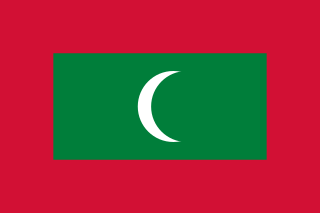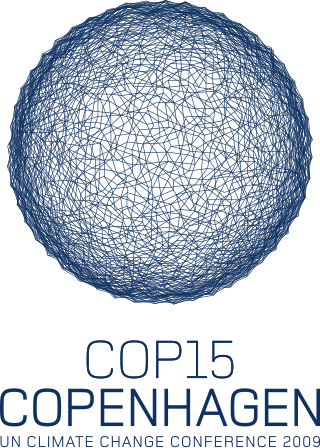
The Maldives, officially the Republic of Maldives, is an archipelagic state and country in South Asia, situated in the Indian Ocean. It lies southwest of Sri Lanka and India, about 750 kilometres from the Asian continent's mainland. The Maldives' chain of 26 atolls stretches across the equator from Ihavandhippolhu Atoll in the north to Addu Atoll in the south.

The history of the Maldives is intertwined with the history of the broader Indian subcontinent and the surrounding regions, comprising the areas of South Asia and Indian Ocean; and the modern nation consisting of 26 natural atolls, comprising 1194 islands. Historically, the Maldives had a strategic importance because of its location on the major marine routes of the Indian Ocean. The Maldives' nearest neighbours are the British Indian Ocean Territory, Sri Lanka and India. The United Kingdom, Sri Lanka and some Indian kingdoms have had cultural and economic ties with the Maldives for centuries. In addition to these countries, Maldivians also traded with Aceh and many other kingdoms in, what is today, Indonesia and Malaysia. The Maldives provided the main source of cowrie shells, then used as a currency throughout Asia and parts of the East African coast. Most probably Maldives were influenced by Kalingas of ancient India who were earliest sea traders to Sri Lanka and the Maldives from India and were responsible for the spread of Buddhism. Stashes of Chinese crockery found buried in various locations in the Maldives also show that there was direct or indirect trade contact between China and the Maldives. In 1411 and 1430, the Chinese admiral Zheng He 鄭和 visited the Maldives. The Chinese also became the first country to establish a diplomatic office in the Maldives, when the Chinese nationalist government based in Taipei opened an embassy in Malé in 1966. This office has since been replaced by the embassy of the People's Republic of China.
The United Nations Framework Convention on Climate Change (UNFCCC) established an international environmental treaty to combat "dangerous human interference with the climate system", in part by stabilizing greenhouse gas concentrations in the atmosphere. It was signed by 154 states at the United Nations Conference on Environment and Development (UNCED), informally known as the Earth Summit, held in Rio de Janeiro from 3 to 14 June 1992. Its original secretariat was in Geneva but relocated to Bonn in 1996. It entered into force on 21 March 1994.

Maldives is an island country in the Indian Ocean, South Asia, south-southwest of India. It has a total land size of 298 km2 (115 sq mi) which makes it the smallest country in Asia. It consists of approximately 1,190 coral islands grouped in a double chain of 26 atolls, spread over roughly 90,000 square kilometers, making this one of the most geographically dispersed countries in the world. It has the 31st largest exclusive economic zone of 923,322 km2 (356,497 sq mi). Composed of live coral reefs and sand bars, the atolls are situated atop a submarine ridge, 960 km (600 mi) long that rises abruptly from the depths of the Indian Ocean and runs from north to south. Only near the southern end of this natural coral barricade do two open passages permit safe ship navigation from one side of the Indian Ocean to the other through the territorial waters of Maldives. For administrative purposes the Maldives government organized these atolls into twenty-one administrative divisions.

The Maldives has remained an independent nation throughout its recorded history, save for a brief spell of Portuguese occupation in the mid-16th century. From 1887 to 1965, the country was a British protectorate while retaining full internal sovereignty. At its independence in 1965, the Maldives joined the United Nations on 20 September.

The South Asian Association for Regional Cooperation (SAARC) is the regional intergovernmental organization and geopolitical union of states in South Asia. Its member states are Afghanistan, Bangladesh, Bhutan, India, Maldives, Nepal, Pakistan, and Sri Lanka. SAARC comprises 3% of the world's land area, 21% of the world's population and 5.21% of the global economy, as of 2021.
Addu City is a city in Maldives that consists of the inhabited islands of Addu Atoll, the southernmost atoll of the archipelago. Addu City is the second-largest urban area in Maldives, in terms of population, and is one of the two urban areas to get the status of "city" other than the capital city, Malé, and Fuvahmulah. Addu City has 6 districts. They are Hithadhoo, Maradhoo-Feydhoo, Maradhoo, Feydhoo, Hulhudhoo and Meedhoo. These divisions are naturally islands, but are well connected. In addition, Addu Atoll has other uninhabited islands.

Guraidhoo is one of the inhabited islands of Thaa Atoll, Maldives.

The United Suvadive Republic was a short-lived breakaway state from the Kingdom of Maldives between 1958 and 1963 consisting of the three southern atolls of the Maldive archipelago: Addu Atoll, Huvadhu Atoll and Fuvahmulah. The first president of the new nation was Abdulla Afeef Didi. The secession occurred in the context of the struggle of the Maldives’ emergence as a modern nation. The United Suvadive Republic inherited a Westminster system of governance cloned from Britain along with other institutional structures.
Post-Kyoto negotiations refers to high level talks attempting to address global warming by limiting greenhouse gas emissions. Generally part of the United Nations Framework Convention on Climate Change (UNFCCC), these talks concern the period after the first "commitment period" of the Kyoto Protocol, which expired at the end of 2012. Negotiations have been mandated by the adoption of the Bali Road Map and Decision 1/CP.13.

The 2009 United Nations Climate Change Conference, commonly known as the Copenhagen Summit, was held at the Bella Center in Copenhagen, Denmark, between 7 and 18 December. The conference included the 15th session of the Conference of the Parties to the United Nations Framework Convention on Climate Change (UNFCCC) and the 5th session of the Conference of the Parties serving as the meeting of the Parties to the Kyoto Protocol. According to the Bali Road Map, a framework for climate change mitigation beyond 2012 was to be agreed there.

Maldives–Pakistan relations are the foreign relations between Pakistan and the Maldives.

Fathimath Dhiyana Saeed is a Maldivian diplomat, and was the Secretary-General of the South Asian Association for Regional Cooperation (SAARC). She was the first woman to hold this post since the organization's inception in 1985. She was appointed Secretary-General at the Thirty-third Session of the SAARC Council of Ministers in February 2011, and assumed office in Kathmandu on 1 March 2011. She succeeded India's Sheel Kant Sharma, whose term ended in February.

The United Nations Climate Change Conference, COP19 or CMP9 was held in Warsaw, Poland from 11 to 23 November 2013. This is the 19th yearly session of the Conference of the Parties to the 1992 United Nations Framework Convention on Climate Change (UNFCCC) and the 9th session of the Meeting of the Parties to the 1997 Kyoto Protocol. The conference delegates continue the negotiations towards a global climate agreement. UNFCCC's Executive Secretary Christiana Figueres and Poland's Minister of the Environment Marcin Korolec led the negotiations.

The United Nations Climate Change Conferences are yearly conferences held in the framework of the United Nations Framework Convention on Climate Change (UNFCCC). They serve as the formal meeting of the UNFCCC parties to assess progress in dealing with climate change, and beginning in the mid-1990s, to negotiate the Kyoto Protocol to establish legally binding obligations for developed countries to reduce their greenhouse gas emissions. Starting in 2005 the conferences have also served as the "Conference of the Parties Serving as the Meeting of Parties to the Kyoto Protocol" (CMP); also parties to the convention that are not parties to the protocol can participate in protocol-related meetings as observers. From 2011 to 2015 the meetings were used to negotiate the Paris Agreement as part of the Durban platform, which created a general path towards climate action. Any final text of a COP must be agreed by consensus.

Husnu Al Suood is a Justice of the Supreme Court of the Republic of Maldives since 8 December 2019. He was the Attorney General of the Maldives from June 2009 to August 2010. He served as the Chief Judge of the Civil Court and as a member of the Judicial Service Commission of Maldives. He also served as a member of the National Human Rights Commission of the Maldives from 2003 to 2005. As a member of the Special Majlis Suood participated in drafting the current constitution of the Republic of Maldives.

The 2016 United Nations Climate Change Conference was an international meeting of political leaders and activists to discuss environmental issues. It was held in Marrakech, Morocco, on 7–18 November 2016. The conference incorporated the twenty-second Conference of the Parties (COP22), the twelfth meeting of the parties to the Kyoto Protocol (CMP12), and the first meeting of the parties to the Paris Agreement (CMA1). The purpose of the conference was to discuss and implement plans about combatting climate change and to "[demonstrate] to the world that the implementation of the Paris Agreement is underway". Participants work together to come up with global solutions to climate change.
The history of climate change policy and politics refers to the continuing history of political actions, policies, trends, controversies and activist efforts as they pertain to the issue of global warming and other environmental anomalies. Dryzek, Norgaard, and Schlosberg suggest that critical reflection on the history of climate policy is necessary because it provides 'ways to think about one of the most difficult issues we human beings have brought upon ourselves in our short life on the planet’.

Abas Basir is an Afghan academic and politician who served as the Minister of Higher Education from 14 September 2020 to 15 August 2021. He also held various significant national and international posts. He has served as Director General of South Asia Co-operative Environment Programme (SACEP) who was nominated by the Government of Islamic Republic of Afghanistan for a term of three years, from August 2018 to September 2020. Dr. Abas Basir was also appointed as Deputy for South Asia Neutregeon Hub between the years 2019–2020.














